Questioni have 3 mixed breed rescue cats, ages 15, 14 and 9
my 15 y.o. cat has behavior changes over the last several months. he was always independent and never a lap cat. now he needs tons of attention . he has gone from sleeping at the foot of the bed to needing to sleep with my arms around him. he has become extremely vocal . his meow is almost like howling and he won't stop until you hold him . sometimes we just find him walking in tight circles over and over again. sometimes he bites for no apparent reason. he still gets around great and never misses the chance to attack 2 80lb pit bulls, which is crazy. he still uses the litter, but last night he peed on the floor. could this be senility?
AnswerLori,
It's quite possible that this kitty is having issues with the kitty version of Alzheimer's (aka senility), but his behaviors could also indicate that he's sick so I would recommend having him evaluated by your veterinarian ASAP. Blood tests, a urinalysis and a thorough physical examination should help determine whether this kitty has got any significant medical issues that could be causing the behavioral changes that you've been seeing in him lately. Cats tend to be very stoic often hiding signs of illness or injury until they're incapable of doing so any longer which means that by the time human caregivers suspect that their kitty is sick or injured the cat is often in much worse shape than they appear to be in. Seeing an independent kitty who suddenly becomes demanding of attention and affection could be an indication that something's very wrong in this kitty's world whether that's related to some sort of physical ailment or he's beginning to show signs of senility. Sometimes like human Alzheimer's patients elderly pets will lose their memory along with other basic functions that most of us take for granted. The changes in the amount and character of this kitty's vocalizations could be a sign that he's in pain as a result of some sort of medical condition (ranging from the relatively minor and treatable such as arthritis to much more serious issues like cancer, liver/kidney failure, etc). It's also quite possible that your kitty is simply afraid because he's misplaced his beloved human and isn't quite sure how to get back to you OR he may simply need the reassurance of your presence if his senses are fading and he's no longer able to hear or see as well as he did when he was younger. Changes like this are frightening for people and we understand that they will eventually happen to most of us, for an elderly pet it has to be even more frightening since they don't necessarily understand what's happening to them or why things are changing so quickly. The circling behavior could be a sign of something serious happening within his brain or it might be related to senility, the only way to know for sure is to have the vet perform the appropriate tests, if your vet feels that some sort of issue is happening within this kitty's brain then it's quite possible your vet will recommend a CT or MRI scan or s/he may even refer you to a veterinary neurologist for assessment. Biting for no apparent reason could be happening because he's in pain from arthritis or some other issue and being handled or getting around hurts him, your kitty may also be frustrated if his capabilities are changing and he doesn't understand that he's okay. Urinating outside of the litter box should always be treated as a medical issue until proven otherwise. If your kitty doesn't have some sort of issue happening with his kidneys, bladder or urinary tract then it's possible that he simply doesn't have the control that he did as a younger cat - the most humane and simplest solution for you and your kitty is to be sure that you provide plenty of litter boxes (at least two per cat plus one per level of your home, more if your house is fairly large) that are regularly maintained (solid waste should be scooped out at least once or twice daily) and that have low enough sides that your kitty can easily get into and out of them even if he does have arthritis pain (which is treatable with daily medication or a combination of conventional and alternative therapies such as acupuncture, massage, herbal medicine or homeopathy if your vet finds arthritis on physical exam).
The changes that you describe could be the result of an illness or injury that you aren't aware of, however it's also possible that your kitty is experiencing frightening changes to his vision, hearing, mobility and other parts of his daily life related to aging. As people age we understand that things are going to change and that we're not going to be capable of the same things at 70 as we were at 17, cats don't necessarily understand that and if things such as sensory changes, memory, mobility or other capabilities have changed fairly quickly your kitty might be very frightened which would explain his need for extra time, attention and handling. At 15 years old your kitty is roughly 76 years old in human terms, of interest your 14 year old kitty is roughly 72 in people years and your 9 year old kitty is still relatively young at 52 people years old. If senility or other age related issues are at the root of these behavioral changes then you can help your kitty regain his happiness, comfort, confidence and independence by making some very basic changes to help ease this kitty's anxieties such as:
- Taking the extra time this kitty needs to let him know that he's still a loved and valued member of your family.
- Modifying things in your household to make this kitty's life easier will also be helpful. If senility (or as I like to call it kitty Alzheimer's) is at the root of your kitty urinating on the floor then having extra litter boxes for his comfort and convenience will be helpful. With elderly cats sometimes their ability to control their urges to urinate or defecate can change so providing several litter boxes above the usual two litter boxes per cat plus one per level of your home that I generally recommend in any cat loving household to prevent house soiling issues will be useful. It's crucial that these litter boxes have low enough sides to make it easy for your aging kitties to get into and out of them easily and that the litter boxes are large enough for your cats to easily dig a hole, turn around, relieve themselves into the hole they've dug for their waste then turn back around to bury their litter box deposit without having to be hunched up in awkward positions. In my experience many covered litter boxes, generally with the exception of those homemade ones made from large plastic storage totes force cats into cramped positions to use the litter box which can be uncomfortable, painful, disorienting or just plain impossible for older cats to manage. For instructions on how to make a covered litter box out of a large plastic storage tote please check out catinfo.org (a site created by a veterinarian to help educate pet parents about nutrition and preventing common feline behavioral issues). Dr. Pierson's got a unique way of making these litter boxes that works wonderfully, but a word to the wise: Don't get cheaper totes with intricate designs on the bottom or sharply angled corners or you'll have a miserable time scooping out urine pucks and solid waste. Be sure that you show your fur kids where their new bathroom facilities are located on each floor of your home by calling them over (if they've got reasonable hearing) - picking them up and bringing them over isn't as reliable a way to show them where their toilet is because they don't have to walk there from where they were in the house meaning that it might be difficult to find their way back to the litter box when they need it. It's absolutely crucial to keep the cats' food in a completely separate room from where their litter boxes are located since cats are fastidious by nature and they absolutely do not want to eat where they go to the toilet which makes perfect sense to me.
- Using disposable plastic pads marketed as either puppy training pads or protective pads that you'd see used in hospital beds to help protect areas around smaller litter boxes will help to catch any accidental overflow from the litter box if you aren't able to replace them immediately with larger litter pans. Puppy training pads are often quite expensive costing roughly 10-20+ dollars Canadian for 15-20 pads depending on the size of pads you're buying and where you buy them where the same disposable pads marketed for use protecting human furniture (for disabled or elderly people with incontinence issues) end up costing 5-15 dollars for the same number of pads at most pharmacies (Walmart is the way to go as far as I've seen). If you'd prefer to save money and reduce the amount of waste you send to the landfill then you can purchase heavier duty reuseable protective pads at pharmacies, medical supply warehouses and home health care centers for roughly 15 dollars per pad and simply wash them when they become soiled.
- Cleaning up litter box accidents shouldn't be done with general household cleaners, using these products can sometimes result in further house soiling accidents because active ingredients in these cleaners intensifies the smell of urine/feces to sensitive feline noses. I recommend using an enzymatic cleaner such as Petzyme which I purchase by the gallon in the dog section of Petsmart. Petzyme is marketed in smaller containers just for cats but it's more expensive on a per milliliter basis so I buy in bulk and use dollar store spray bottles. Petzyme has proven safe and effective at cleaning up vomit (human and feline), the occasional litter box accident (or indiscretion involving a kitty wiping their tush on the carpet when they have a messy bowel movement or one that stays with them for longer than they're prepared to wait in the litter box) and out of curiousity I used it once when I cut my foot rather badly and left blood on our cream colored carpet - to my amazement when used as directed Petzyme does an incredible job of removing stains and odors. Enzymatic cleaners use beneficial bacteria to digest stains and odors from urine, vomit, feces, etc so that the odors don't reappear at a later date and they're not masked so that while we no longer smell them our cats are bombarded with offensively strong odors. Petzyme also has instructions on the label for use in laundry if your kitties ever have an accident or vomit on clothing or bedding. If you're not able to find Petzyme you can purchase any number of other enzymatic cleaners in the dog section of most pet supply stores (they're generally marketed as a means of cleaning up puppy training accidents) or you can try your local janitorial supply store as these types of cleaner are also often used by professional cleaners to clean a variety of messes.
- Elderly cats will sometimes bite when they're startled. If they're not able to hear and see you approach as they did when they were younger the cat can be very surprised if you approach and immediately try to handle or speak to them. It's best to avoid having children interact with elderly pets (or any pet in my opinion, but it's especially important with elderly and special needs pets that kids are kept closely supervised for their safety and the safety of the pet) unsupervised as they may not have the patience or willingness to put up with inquiring hands and inexperienced handling, especially if they've got arthritis or other medical conditions common in elderly pets (and people). If you want to know how well your kitty sees you can try a simple test at home - get his attention, when you're certain you have it drop a kleenex or cotton ball in his line of sight, if his vision is good he'll track the object, if he doesn't see well it will be quite obvious by the way he reacts to that test. Your vet can perform extensive vision testing, but that can become very expensive and require specialized equipment that most general practices don't have, so ultimately the decision of whether to go ahead with formal vision testing is up to you. If your kitty has lost his hearing this can be a bit more difficult to assess since cats are incredibly sensitive animals who can sense vibration - some deaf cats will actually mirror the reactions of their housemates to different sounds. Your vet may be able to test your kitty's hearing formally, but if you'd rather not subject him to expensive testing that may upset him then you can try simple ways of approaching your kitty that let him know you're coming before he wakes up to find you've suddenly appeared which can be pretty scary - if you've ever woken up to someone at your bedside that you weren't aware of until you opened your eyes you know what I mean. You can let your kitty know that you're nearby by simply turning on a light near him or gently touching the piece of furniture he's sleeping on (like applying gentle pressure to the seat of the chair he's occupying until he shows signs of being aware of your presence).
- Reassuring an anxious elderly kitty is important and sometimes they need extra love, attention, understanding and handling. Providing these necessary comforts for this kitty will help to alleviate his anxieties.
- Having your vet examine this kitty thoroughly from head to toe including a urinalysis, blood work and any other testing your vet recommends will help to ensure that you're able to start treating any medical issues that your kitty might be having which will help make his life much more comfortable and his world will be much easier for him to live in.
A gentle, safe, effective way to treat simple anxiety regardless of the cause is to use Bach flower remedies. These homeopathic remedies are made from flower essences and I've used them in my home for well over 10 years with excellent results. There are a few beautiful things about using homeopathic remedies over traditionally used psychotropic drugs: 1) you aren't altering your kitty's brain chemistry in order to treat the symptoms of anxiety, you're simply treating the root cause of the problem with all natural, safe remedies that don't have side effects or serious risks to the long term health and wellbeing of your kitty, 2) anti-depressant/anxiety drugs often have serious risks associated with their use as well as unpleasant side effects, homeopathic remedies are safe and they don't have side effects, 3) if the wrong psychotropic medication is given to your kitty there can be serious consequences, if you make a mistake and administer the wrong homeopathic remedy the absolute worst thing that will happen in the majority of cases is absolutely nothing. Overall the use of homeopathic remedies should help to improve your kitty's emotional state meaning he'll be less anxious, possibly less confused, definitely less frightened and overall he'll be happier, healthier and calmer. You can try to find a holistic veterinarian in your area that uses homeopathic remedies in his/her practice if you'd like. If you live in an area where veterinary care is somewhat limited then you can speak with certified homeopaths practicing on people in your area as some practitioners are willing to help out pets. In the event that you're unable to find a homeopath or holistic vet in your area then you may want to consider contacting Dr. Chambreau on the Ask a Vet portion of this site, she's a holistic vet (although she doesn't practice conventional medicine any longer she does have a fair bit of knowledge in the area of flower essences and homeopathic remedies). As far as I know Dr. Chambreau is willing to do phone and email consultations within the US for a fee that you'd have to discuss with her. Some homeopathic remedies that you might find useful are the Bach flower remedies such as:
- Rescue Remedy which is a blend of 5 flower essences. This remedy is designed to calm and reassure and it's generally used by veterinarians and pet parents worldwide to treat anything from anxiety to severe psychological trauma. This remedy can also be administered in the event of injury or illness to help calm kitty on the way to your veterinarian where s/he will receive treatment. In an emergency situation it's best not to administer these remedies by mouth as they may require sedation and you don't want them to vomit under anesthesia, instead gently massage the remedy a drop at a time into the cat's ear flaps or the relatively fur free area in front of the ear until the kitty shows signs of calming down. When administering Bach flower remedies this way it's very important to be careful that you don't get any into the ear because the flower essences are preserved in a grape alcohol solution that will sting if it ends up in kitty's ears. A dose of roughly 4-8 drops each time given 3-4 times per day for 2-4 weeks is generally sufficient for regular non-emergency use. When you do notice positive change in the kitty you can then begin gradually reducing the daily dosage and then the frequency that the remedy is given which will allow the kitty to retain positive changes without the potential for regression. If your kitty does regress simply increase the dose and frequency of the remedy again for a few days and gradually begin weaning your kitty off of the remedy. Generally I've found that when weaning a kitty off of Rescue Remedy that I've administered regularly for a period of time at a dose of 7 drops three times daily I'll start off by reducing the first dose of the day to 6 drops while leaving the other doses the same as they were. Then on the second day I'll administer the 6 drops for the first daily dose and the second dose will be reduced to 6 drops while the third dose remains at 7 drops. I'll continue this pattern until the kitty has been weaned off of the remedy completely.
***Noteworthy***Rescue Remedy is generally considered a remedy that's okay to administer in any situation prior to seeking the advice of a holistic vet or homeopath. Other remedies really should be recommended by someone with experience using homeopathy because you want to interfere as little as possible with your kitty's physical, emotional and psychological states which means that the fewer treatments you need to help him accomplish a happy, healthy and balanced state the better it is for him. Homeopathic remedies aren't toxic or dangerous, but they are powerful, effective ways to help treat a variety of physical, emotional and psychological issues that are safer and gentler overall than the majority of traditional allopathic medicines.
- Chamomile helps to calm the emotions and soothe irritable, restless or cranky animals.
- Heather helps to restore balance to a needy, clingy or overly talkative kitty.
- Holly is useful to help reduce anger and jealousy. A kitty such as yours who has had a dramatic increase in his need for love, comfort and contact may benefit from this remedy.
- Impatiens is a remedy geared towards correcting impatience, irritability and reducing nervous energy. This remedy is also useful for any kind of pain (physical or emotional).
- Walnut may be helpful to this kitty since he's become more sensitive to his environment overall since it helps to balance out a kitty that's over sensitive to his environment or stressed out about the changes to his life as he ages.
In general the idea with using homeopathic remedies like Bach flower remedies is to use as few remedies as you can to achieve positive results. I'd recommend against using more than two to three remedies at the most at any given time because using any more than that may mean that none of the remedies are effective since there are too many influences trying to help bring your kitty's psychological/emotional states back to a state of balance. If you'd like to read more about Bach flower remedies you can check out preciouspets.org and http://www.bachcentre.com/centre/remedies.htm these sites both provide excellent information about the use of these unique remedies.
Hopefully this information has given you a good starting place to go out and get the information you need to find out what's happening with this kitty and make informed choices about treating any medical issues that may present themselves as this kitty ages. My own veterinarian is a wonderful holistic vet and when my eldest cat developed severe acute renal failure after eating tainted cat food during the Menu Foods pet food recalls of 2007 she used a combination of traditional treatments and homeopathic remedies to save her life. The vet at the 24 hour emergency clinic told me that the most humane option was to euthanize my girl since her kidney values were showing very serious kidney failure and that there wasn't any real explanation for why our girl's kidneys had failed other than "this happens to middle aged cats sometimes, we don't really know why." I wasn't satisified with those answers so I took my girl home and waited for our vet's answering service to put us through later that morning, when we told our vet about our baby girl's kidney values she recommended that we bring her into the clinic immediately for treatment. Our girl was hospitalized, placed on IV fluids to help rehydrate her, reduce the strain on her kidneys and flush the toxins out of her system. The following day things were looking worse, our girl's kidney function had further deteriorated and we were really worried that we'd have to euthanize her. Our vet treated her with homeopathic remedies and two days later our girl's kidney function was completely normal again - we picked her up the morning after her normal blood test results and we were given the conventional discharge instructions for a kitty with renal failure - fluids injected under the skin daily and an expensive low protein prescription diet to be fed for the remainder of our girl's life. We were thrilled to have our girl back so we immediately set about establishing a routine for the treatments that would keep her alive and ensure that she had a good quality of life. Our girl immediately decided that she absolutely would not eat the prescription food (our other two resident cats thought the food was delicious, go figure!) so our vet recommended that we put her back onto the food the other two cats were eating. Our girl was monitored closely by regular blood work and her kidney function continued to remain normal. After a year of treatment our vet recommended that we begin weaning our girl off of her daily injections of fluids to see if her kidney function had returned to normal. As of May 2009 our girl hasn't received any supplemental fluids and her kidney function is 100% normal - if we'd done conventional treatments alone I don't think that our girl would be close to celebrating her 11th birthday that's coming up in April 2010. Alternative therapies saved my girl's life and I would strongly recommend that you consider them whether your kitty's behaviors have changed as a result of a physical health problem or he's developed kitty Alzheimer's, their effectiveness may surprise you, I know I was shocked at the immediate turnaround in my girl's physical condition, her emotional state (she was understandably afraid) and her overall recovery. If you have any further questions, concerns or you'd like me to provide further information about modifications you can make to help make things easier for your elderly kitty OR alternative treatments that might be helpful I'd be happy to help you out to the best of my ability. For now you and your kitty are in my thoughts and prayers, please don't be afraid to send along an update to let me know how he's doing.

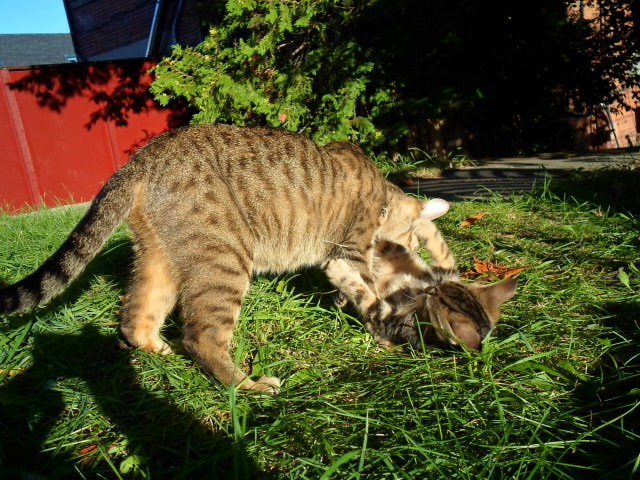 Cat Breed Identification?
Question
Playtime Pretty Girl
Hi there. &n
Cat Breed Identification?
Question
Playtime Pretty Girl
Hi there. &n
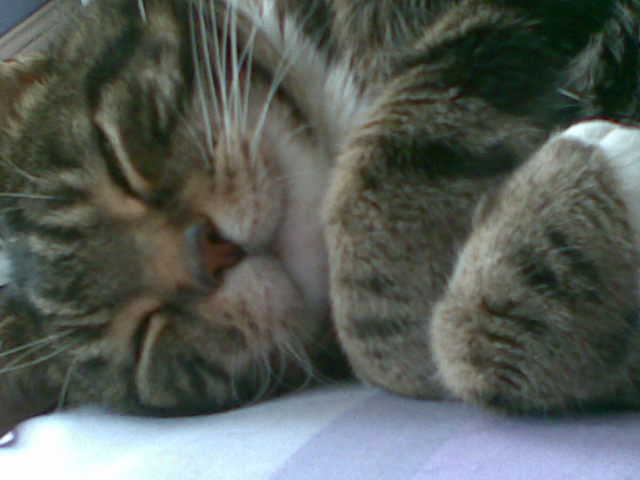 my cat!
QuestionQUESTION: I recently e-mailed a question to you
my cat!
QuestionQUESTION: I recently e-mailed a question to you
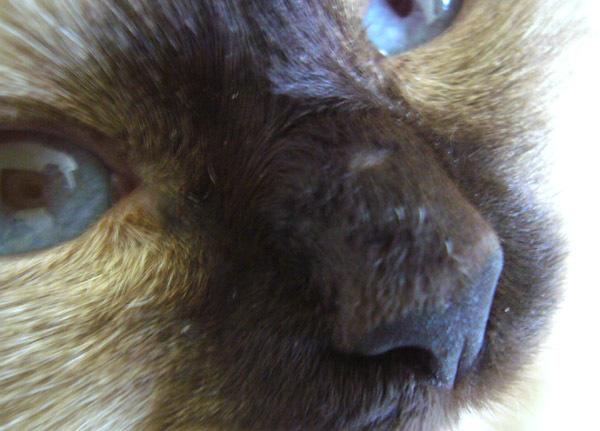 Bald spot on my cats nose
Question
bald spot
Hello Jessica,
Today I notic
Bald spot on my cats nose
Question
bald spot
Hello Jessica,
Today I notic
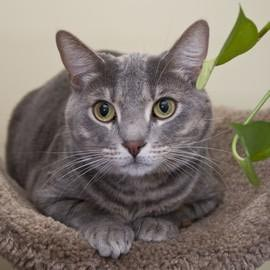 identify breed of cat
Question
Male cat 4 years ol
I recently adopted
identify breed of cat
Question
Male cat 4 years ol
I recently adopted
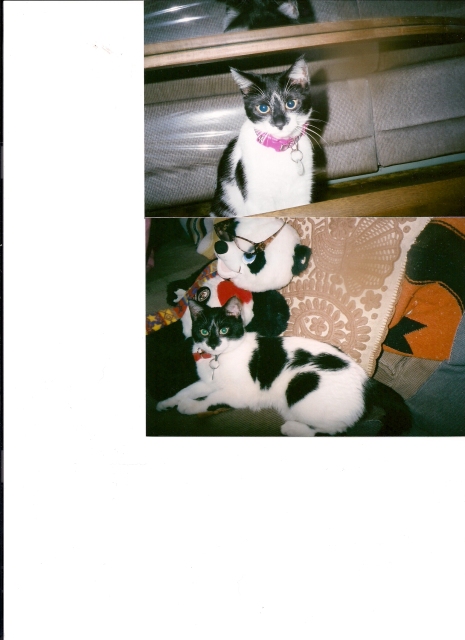 Recently Adopted Cat
Question
CREAM PUFF
Hello !
Hoping all is well.
Recently Adopted Cat
Question
CREAM PUFF
Hello !
Hoping all is well.